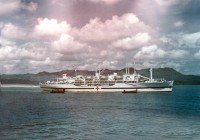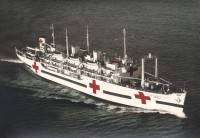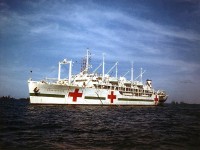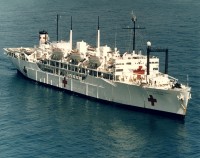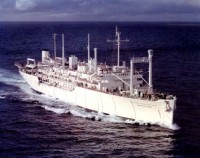Haven-class hospital ship
Basic information
Ship measurements
Machine
- Geared turbine, single screw
Personnel
Combat assets
- 802 patient beds
- None
- 1 * MEDEVAC helicopter
The Haven-class hospital ships were constructed for the United States Navy (USN) during during World War II. These ships also participated in the Korean War and the Vietnam War. They were among the first ships equipped to receive injured personnel directly by helicopter and were the first fully air-conditioned ships in the USN. The first vessel was laid down in July 1943, with the final one launched in August 1944. During that period, the United States built six Haven-class hospital ships. The last of these ships was removed from the Naval Vessel Register in 1989. One ship sank after a collision in 1950, while the remaining five were dismantled. Haven-class ships were eventually succeeded by the Mercy-class hospital ships.
The class design was based on the United States Maritime Commission's (MARCOM) Type C4 vessel (specifically the C4-S-B2 design). The six hospital ships of the Haven class had a standard displacement of 11,320 tons and a full load displacement of 15,600 tons. They measured 151 meters in length at the waterline and 160 meters overall, with a beam of 21.79 meters and a maximum draft of 7.3 meters. Propulsion was provided by a single shaft powered by General Electric geared turbines, which were driven by steam from two Babcock & Wilcox boilers, generating 9,000 shaft horsepower (6,700 kW). This enabled the vessels to reach a top speed of 18.3 knots (33.9 km/h; 21.1 mph). They had a crew complement ranging from 568 to 574 and could accommodate 802 patients during the Second World War. Additionally, the ships were air-conditioned.
Following the war, a landing platform was added to the rear of the ships, allowing for the medical evacuation of patients by helicopter, with the exception of the Benevolence. In 1967–1968, the Sanctuary underwent upgrades, during which its hospital capacity was reduced to 750 beds. The crew consisted of 375 members, including 17 officers and 323 hospital personnel, made up of 24 doctors, 29 nurses, 3 dentists, and 258 medical corpsmen. Further modifications were made to the vessel between 1972 and 1973, when its classification was altered to «dependent support ship.» It was outfitted with specialized facilities for obstetrics, gynecology, maternity, and nursery services, becoming the first ship to have a mixed-gender crew.
The Haven-class vessels were originally built as MARCOM Type C4 standard cargo ships and initially given standard cargo ship names. However, on 22 June 1944, their hulls were selected for conversion into hospital ships. These ships were renamed to reflect themes of comfort and aid. The first two ships of the class were finished in time to serve in the Pacific Theater during World War II. All five ships participated in the postwar repatriation of troops and former prisoners of war to the United States. Haven and Benevolence were also assigned to Operation Crossroads, a series of nuclear weapons tests. After the tests, both ships were placed in reserve but were later reactivated for service during the Korean War. During reactivation, Benevolence was struck by a merchant vessel while returning to harbor and sank in August 1950, resulting in 18 fatalities and 13 missing persons. The remaining hospital ships continued to serve in the Korean War, with Consolation becoming the first hospital ship to receive helicopter evacuations directly from the battlefield. After the war, all the ships were decommissioned and placed in reserve. In 1960, Consolation was leased by the People to People Health Foundation and operated by American President Lines, providing medical care to underdeveloped regions around the world. The ship was renamed Hope during this time. Repose and Sanctuary were later reactivated for service in the Vietnam War.
In 1969, Haven was sold to private buyers, converted into a chemical tanker, and renamed first Clendenin, then Alaskan. Tranquillity was sold for scrap in 1974. After being returned to the US Navy, Consolation was also sold for scrap in 1975. Repose was decommissioned in 1970 and scrapped in 1975. Sanctuary underwent modernization between 1972 and 1973, in preparation for a planned deployment to Piraeus, Greece. Reclassified as a «dependent support ship,» it was meant to offer medical and other services to the families of American military personnel stationed at Piraeus, alongside the planned homeporting of an aircraft carrier and six destroyers. However, the deployment was canceled, but Sanctuary became the first USN ship to deploy with a mixed-gender crew. Sanctuary was placed in reserve in 1975 and stayed there until it was sold to private interests in 1989. Initially, the ship was intended to serve as a floating hospital in Africa, but that plan fell through. Instead, it was used as a drug rehabilitation center in Baltimore, Maryland. Eventually, the last Haven-class ship, ex-Sanctuary, was scrapped in 2011. The Haven-class hospital ships were succeeded by the Mercy-class hospital ships.
Ships6
- Comments
 en
en ru
ru uk
uk
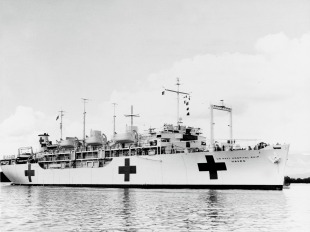

 United States Navy
United States Navy Sun Shipbuilding and Drydock Company
Sun Shipbuilding and Drydock Company